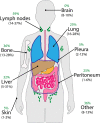"Metastatic Cancer of Unknown Primary" or "Primary Metastatic Cancer"?
- PMID: 32010631
- PMCID: PMC6978906
- DOI: 10.3389/fonc.2019.01546
"Metastatic Cancer of Unknown Primary" or "Primary Metastatic Cancer"?
Abstract
Cancer of unknown primary (CUP) is an umbrella term used to classify a heterogeneous group of metastatic cancers based on the absence of an identifiable primary tumor. Clinically, CUPs are characterized by a set of distinct features comprising early metastatic dissemination in an atypical pattern, an aggressive clinical course, poor response to empiric chemotherapy and, consequently, a short life expectancy. Two opposing strategies to change the dismal prognosis for the better are pursued. On the one hand, following the traditional tissue-gnostic approach, more and more sophisticated tissue-of-origin (TOO) classifier assays are employed to push identification of the putative primary to its limits with the clear intent of allowing tumor-site specific treatment. However, robust evidence supporting its routine clinical use is still lacking, notably with two recent randomized clinical trials failing to show a patient benefit of TOO-prediction based site-specific treatment over empiric chemotherapy in CUP. On the other hand, with regards to a tissue-agnostic strategy, precision medicine approaches targeting actionable genomic alterations have already transformed the treatment for many known tumor types. Yet, an unmet need remains for well-designed clinical trials to scrutinize its potential role in CUP beyond anecdotal case reports. In the absence of practice changing results, we believe that the emphasis on finding the presumed unknown primary tumor at all costs, implicit in the term CUP, has biased recent research in the field. Focusing on the distinct clinical features shared by all CUPs, we advocate adopting the term primary metastatic cancer (PMC) to denominate a distinct cancer entity instead. In our view, PMC should be considered the archetype of metastatic disease and as such, despite accounting for a mere 2-3% of malignancies, unraveling the mechanisms at play goes beyond improving the prognosis of patients with PMC and promises to greatly enhance our understanding of the metastatic process and carcinogenesis across all cancer types.
Keywords: cancer of unknown primary (CUP); clinical trial; metastasis; next generation sequencing; primary metastatic cancer; targeted therapy; tissue of origin; treatment.
Copyright © 2020 Kolling, Ventre, Geuna, Milan, Pisacane, Boccaccio, Sapino and Montemurro.
Figures



References
Publication types
LinkOut - more resources
Full Text Sources
Other Literature Sources

